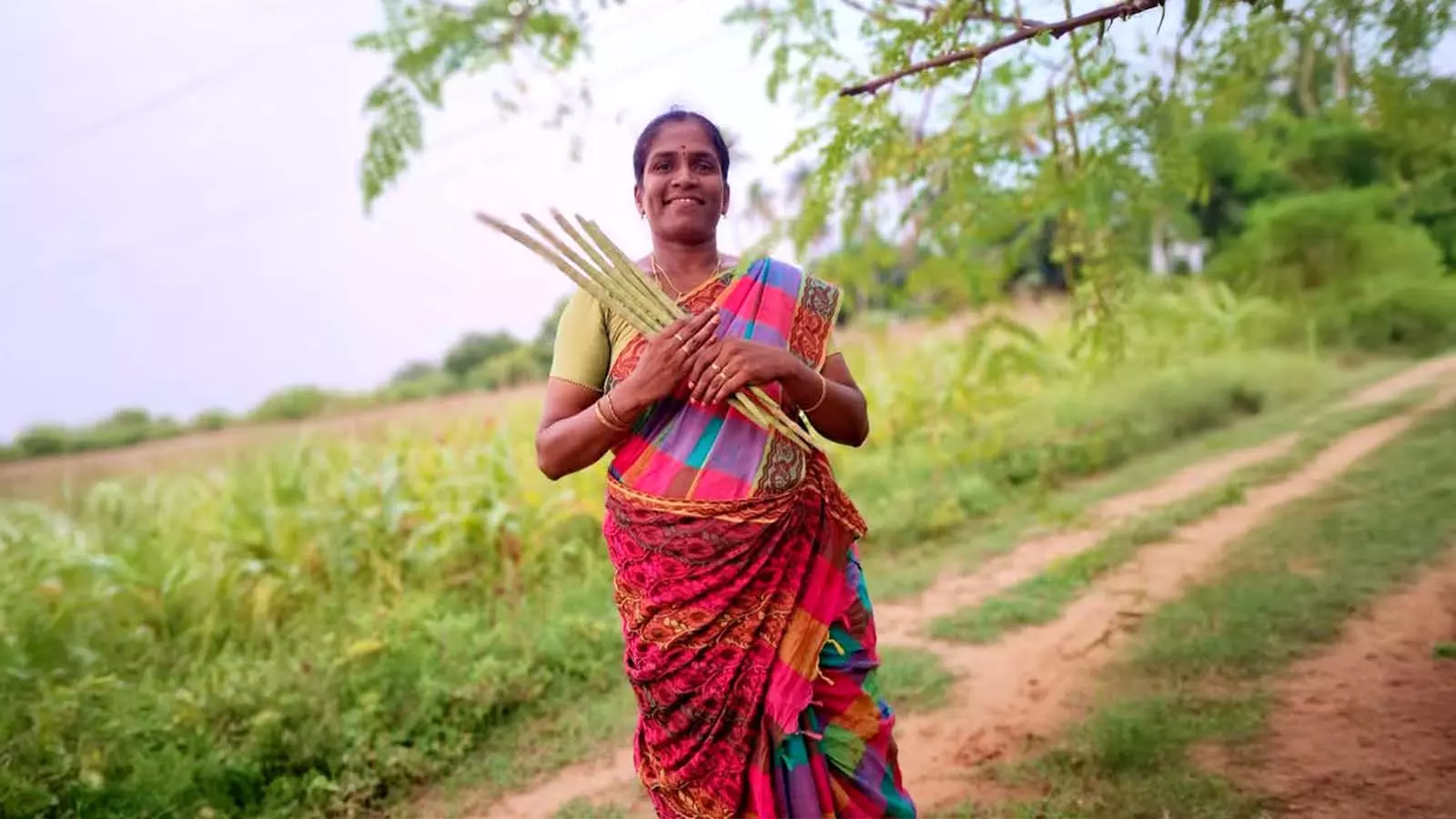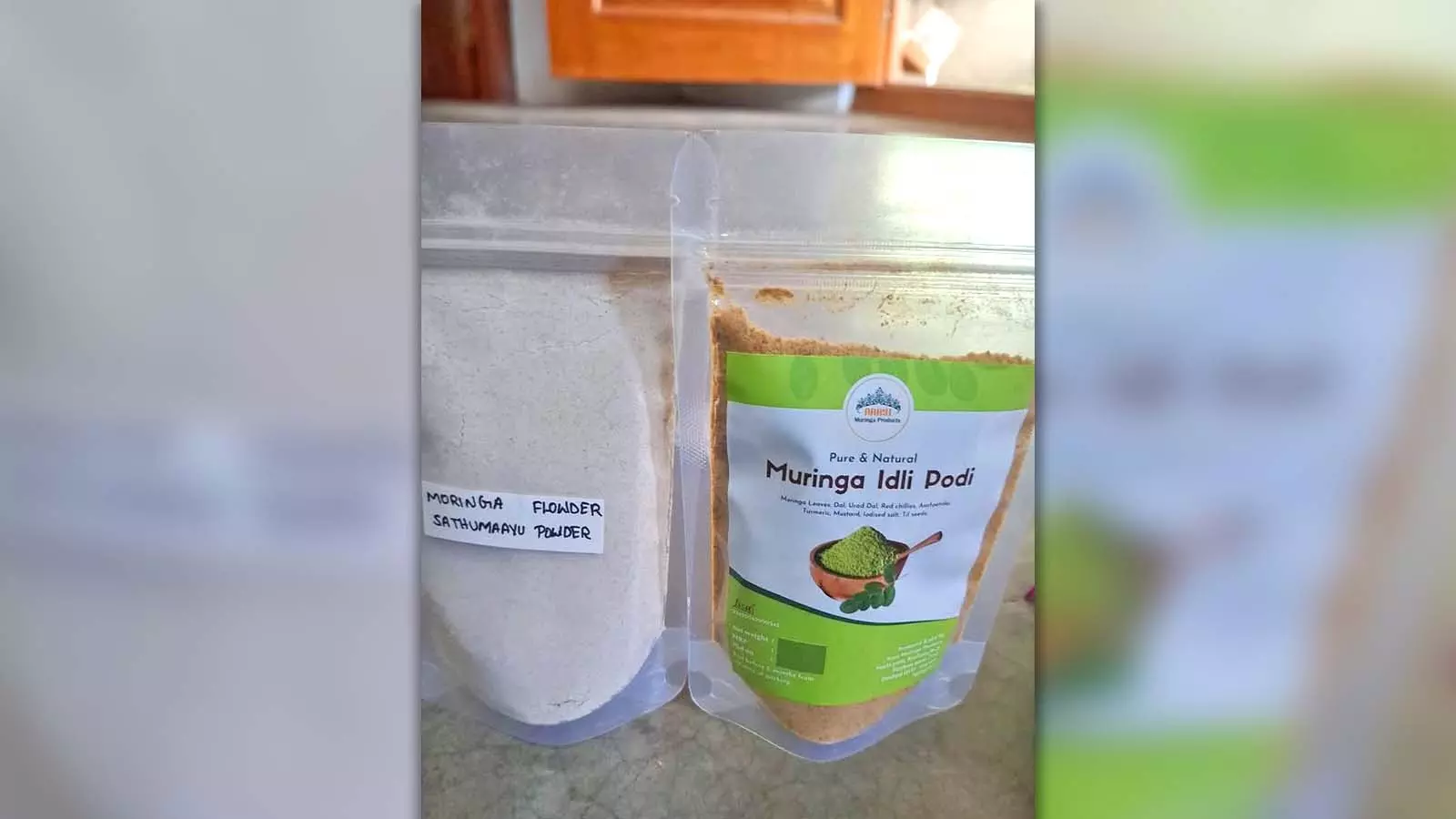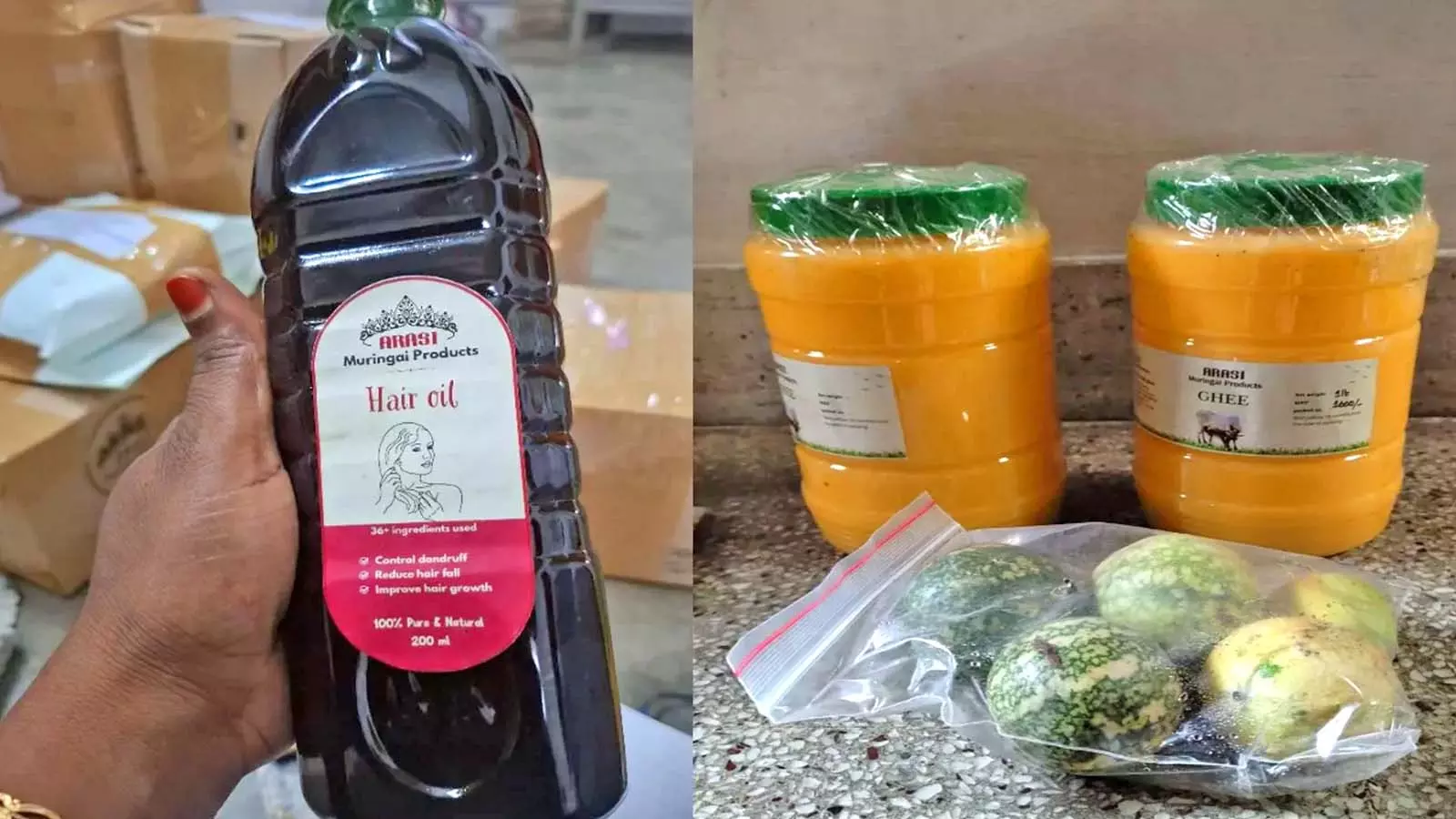
- Home
- India
- World
- Premium
- THE FEDERAL SPECIAL
- Analysis
- States
- Perspective
- Videos
- Sports
- Education
- Entertainment
- Elections
- Features
- Health
- Business
- Series
- In memoriam: Sheikh Mujibur Rahman
- Bishnoi's Men
- NEET TANGLE
- Economy Series
- Earth Day
- Kashmir’s Frozen Turbulence
- India@75
- The legend of Ramjanmabhoomi
- Liberalisation@30
- How to tame a dragon
- Celebrating biodiversity
- Farm Matters
- 50 days of solitude
- Bringing Migrants Home
- Budget 2020
- Jharkhand Votes
- The Federal Investigates
- The Federal Impact
- Vanishing Sand
- Gandhi @ 150
- Andhra Today
- Field report
- Operation Gulmarg
- Pandemic @1 Mn in India
- The Federal Year-End
- The Zero Year
- Science
- Brand studio
- Newsletter
- Elections 2024
- Events
How Tamil Nadu is banging drum-sticks success from villages to the world

In the quiet lanes of Dindigul, Tamil Nadu, P. Ponnarasi, once a naïve homemaker and farmer, is now hailed as the ‘Murungai Arasi of Tamil Nadu’ — the Moringa Queen of Tamil Nadu — for transforming her family’s 10-acre moringa farm into a thriving enterprise with global reach.Ponnarasi (38), mother of four and a Class 10 dropout, is now an exporter. Her parcels of moringa powder,...
In the quiet lanes of Dindigul, Tamil Nadu, P. Ponnarasi, once a naïve homemaker and farmer, is now hailed as the ‘Murungai Arasi of Tamil Nadu’ — the Moringa Queen of Tamil Nadu — for transforming her family’s 10-acre moringa farm into a thriving enterprise with global reach.
Ponnarasi (38), mother of four and a Class 10 dropout, is now an exporter. Her parcels of moringa powder, oil, and other value-added products reach countries like the USA, Singapore, and France on a regular basis. While the COVID-19 pandemic-induced lockdown affected many entrepreneurs, Ponnarasi’s inbox was full of additional orders and attracted new customers. “Moringa in my family farm changed my life; it gave me purpose,” is her short answer to questions about her transformation.
The humble drumstick has empowered hundreds of women farmers in Tamil Nadu.

P. Ponnarasi says moringa cultivation gave her a purpose in life. Photos: Pramila Krishnan
Like any other farmer, Ponnarasi too plucked drumsticks from her family farm and sold them to agents in the vegetable market until 2019. After she attended a training programme related to value-added products of moringa, she improved her entrepreneurial skills and established her own business.
“My parents are drumstick farmers, and my husband too is a farmer. Right from my childhood, there was not a single day without a conversation related to drumsticks. Sometimes, the price of drumsticks would be as high as ₹100 per kilo. We had difficult times when we had to sell a kilo of drumstick for ₹5. I wanted to improve my earnings but had no choice except drumstick,” explains Ponnarasi.
A session organised by Tamil Nadu Agricultural University, where agricultural expert John Kennedy introduced her to value-added moringa products, gave her all the inspiration she needed. She was trained in oil extraction and moringa product development by agricultural department officers. Now, she prepares over 30 different products from moringa.

Moringa powder
“They told me about the international demand for moringa oil. That’s when I realised we were sitting on a gold mine. With government aid, I built a Pack House, obtained export certifications, and launched 36 moringa-based products — from oils and soup powder to idli podis. There were initial hiccups, but I survived with regular training from experts and the support of my family. Now, I export to countries like the US, France, and Singapore. I earn close to ₹12 lakh annually, largely through social media sales,” she told The Federal.
Through workshops and mentorship, she’s now helping others find their voice in farming too. She also explains the usage of social media in promoting the value-added products. “I post videos on cultivation, pruning of trees, plucking of leaves, drumsticks, oil production, frying leaves for soup mix, and many other activities. These videos are a big hit, giving me additional income also. I send 50 parcels in and around India every day. I send close to 20 international parcels in a month,” said Ponnarasi.
She cleared her debts, enrolled her four children in private schools, and constructed her office in the last six years. Now, she is designing a website for her business through a friend — all with the income from value-added products of moringa.
Like Ponnarasi, scores of women entrepreneurs in Tamil Nadu have benefitted from the production and sales of value-added products of drumstick, say officials of the Post-Harvest Technology Centre of Tamil Nadu Agricultural University in Coimbatore. The centre has been training several farmers in producing value-added products of moringa in various sectors like the food and health segment, beauty and personal care segment, agricultural segment, and wellness segment.

Moringa products
For example, healthcare products like moringa leaf powder — a staple superfood rich in iron, calcium, and antioxidants — and moringa tea bags, known for their detoxifying and immune-boosting properties, are in high demand. Personal care products like moringa oil — a cold-pressed seed oil used in skincare, hair care, and cosmetics — and moringa soap — a herbal soap with antibacterial and anti-inflammatory benefits — are priced from ₹200 to ₹1,500 in the retail market. Moringa soup mix and idli powder are exported to Indian families in the US and France.
Another entrepreneur named Jamuna Arul of Vazhapadi village in Salem district finds her entrepreneurial journey competitive yet smooth. She initially wanted to improve the health of her family by giving nutritional supplements like moringa soup and leaf powder and that helped her take the same as a business idea.
Awareness related to moringa as an immunity booster during the pandemic made her think about selling products instead of selling smaller quantities in her village. “I take much care in drying and pounding leaves. Earlier, many of the customers were in my village, now my products are sent to various states across India,” says an excited Jamuna. Her instant moringa soup has received encouraging feedback from many customers. “I send parcels in couriers and also sell products at home. Now I'm getting trained in preparation of moringa oil,” said Jamuna.
Dr. S. Parvathy, who heads the Home Science Extension department of the Home Science College and Research Institute in Madurai, has developed trendy fast-food products like moringa noodles, soup, and licks.
“Moringa leaf has been recognised as a nutritional supplement around the world now. The leaves can be eaten as a vegetable. The leaves can also be dried and stored for many months under ambient conditions with minimum changes in nutritional value. Similarly, seeds and drumsticks as whole vegetables can be cooked in multiple ways and that would suit cooking styles in many countries,” she said.
She also added that the promotion of moringa leaf-incorporated foods would help not only in alleviating micronutrient deficiencies but also in boosting immunity.
Quoting research articles related to the nutritional value content of moringa, she said, “The dried moringa leaves have calcium equivalent to 17 times that of milk, and the vitamin C content is seven times more than that of oranges. Its potassium is 15 times that of bananas, 25 times the iron of spinach, 10 times the amount of vitamin A in carrots, and nine times the protein content in yoghurt. It has an impressive range of medicinal uses with higher nutritional value.”
According to the Tamil Nadu Food Processing and Agricultural Export Development Corporation (TNAPEx) officials, Tamil Nadu, which leads India in moringa cultivation, exports over 20 different value-added products related to moringa.
As per 2023–24 data from the Department of Horticulture and Plantation Crops of Tamil Nadu, the state has 20,741 hectares under moringa cultivation, producing 841,807 metric tons of the crop — the highest in the country.
As part of the 2021–22 Agricultural Budget, the Tamil Nadu government announced the creation of a ‘Moringa Export Zone’, covering nine districts, and established the Moringa Special Export Service Center in Madurai. K. Alagusundaram, managing director and CEO of TNAPEx, told the media that Tamil Nadu is poised to play a major role in the global moringa supply chain.
“Currently, Tamil Nadu’s 35 leading exporters grow moringa leaves across 600–800 acres, producing 720 metric tonnes of leaf powder annually — a market worth approximately ₹30 crore. According to APEDA (Agricultural and Processed Food Products Export Development Authority), the global moringa export market is estimated to touch US $1,000 crore by 2025, with moringa leaf powder alone accounting for US $600 crore. We are bridging the gap between moringa farmers and international markets through sustainable and scientific approaches,” he said.
Entrepreneurs in Navvaladi village in Tirunelveli district, 630 km from Chennai, recently supplied 60 metric tonnes of fresh organic moringa leaves to a private firm. This was in turn converted into six metric tonnes of export-grade moringa powder, worth ₹20 lakh. Officials and farmers discussed not only about profit made by farmers but also about long-term sustainability and giving farmers global visibility through moringa.
